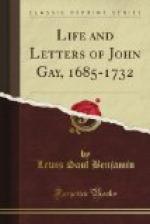“Wine,” a subject on which Gay, even at the age of twenty-two, could write with some authority, secured a sufficient popularity to be paid the doubtful compliment of piracy in 1709, by Henry Hill, of Blackfriars, on whom presently the author neatly revenged himself in his verses, “On a Miscellany of Poems to Bernard Lintott,” by the following reference:—
While neat old Elzevir is reckon’d
better
Than Pirate Hill’s brown sheets
and scurvy letter.
This blank-verse poem, which may have been suggested by John Philips’ “Cider,” published in 1708, is written in the mock-heroic strain, and although it has no particular value, shows some sense of humorous exaggeration, of which Gay was presently to show himself a master.
Of happiness terrestrial, and the source
Whence human pleasures flow, sing, Heavenly
Muse,
Of sparkling juices, of th’ enlivening
grape,
Whose quick’ning taste adds vigour
to the soul.
Whose sov’reign power revives decaying
Nature,
And thaws the frozen blood of hoary age,
A kindly warmth diffusing—youthful
fires
Gild his dim eyes, and paint with ruddy
hue
His wrinkled visage, ghastly wan before—
Cordial restorative to mortal man,
With copious hand by bounteous gods bestow’d.
These are the opening lines. The concluding passage describing the tippling revellers leaving the tavern suggests, as has more than once been pointed out, the hand that afterwards wrote “Trivia.”
Thus we the winged hours in harmless mirth
And joys unsullied pass, till humid night
Has half her race perform’d; now
all abroad
Is hush’d and silent, now the rumbling
noise
Of coach or cart, or smoky link-boy’s
call
Is heard—but universal Silence
reigns:
When we in merry plight, airy and gay.
Surprised to find the hours so swiftly
fly.
With hasty knock, or twang of pendent
cord.
Alarm the drowsy youth from slumb’ring
nod;
Startled he flies, and stumbles o’er
the stairs
Erroneous, and with busy knuckles plies
His yet clung eyelids, and with stagg’ring
reel
Enters confused, and muttering asks our
wills;
When we with liberal hand the score discharge,
And homeward each his course with steady
step
Unerring steers, of cares and coin bereft.
So far as is known, Gay preserved a profound silence for three years after his publication of “Wine,” and then, on May 3rd, 1711, appeared from his pen, “The Present State of Wit, in a Letter to a Friend in the Country,” sold at the reasonable price of three-pence. This attracted the attention of Swift. “Dr. Freind[9] ... pulled out a two-penny pamphlet just published, called ‘The State of Wit’, giving the characters of all the papers that have come out of late,” he wrote in the “Journal to Stella,” May 12: “The author seems to be a Whig, yet he speaks very highly of a paper called the Examiner,




